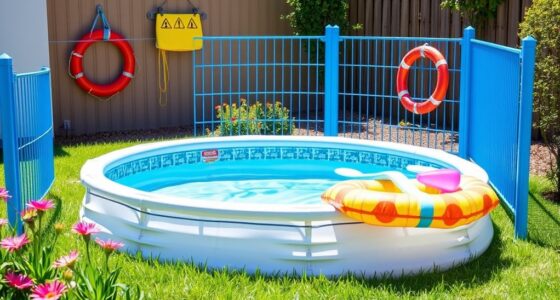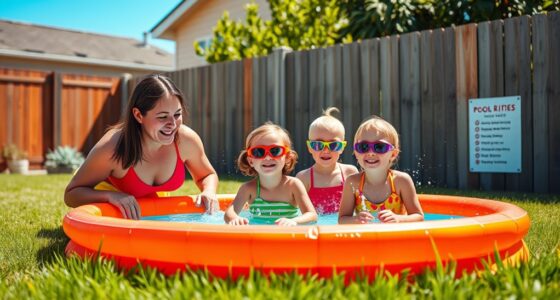Choosing between an indoor and outdoor endless pool depends on your priorities. Indoor pools offer better privacy, climate control, and year-round use, but come with higher installation and maintenance costs. Outdoor pools are more affordable initially and enhance your yard’s appeal but are exposed to weather, debris, and seasonal limits. Your choice influences security, convenience, and overall property value. Continue exploring to discover which setup aligns best with your lifestyle and home goals.
Key Takeaways
- Indoor pools offer year-round use and climate control, while outdoor pools depend on weather conditions and seasonal availability.
- Indoor installations have higher upfront costs and maintenance due to ventilation and humidity management; outdoor pools are generally cheaper initially.
- Privacy and security are easier to manage indoors, whereas outdoor pools require fencing and landscaping for safety and privacy.
- Outdoor pools enhance yard aesthetics and leisure space, while indoor pools provide a sleek look and integrated design options.
- Both types increase property value; indoor pools add convenience and privacy, outdoor pools boost curb appeal and outdoor entertainment.
Privacy and Security Considerations

When choosing between an indoor or outdoor pool, privacy and security are essential factors to contemplate. With an outdoor pool, you might worry about neighbors, passersby, or curious visitors seeing into your yard. Installing fencing, privacy screens, or landscaping can help, but it requires ongoing effort. An indoor pool offers more control over who enters your space, reducing the risk of trespassing or vandalism. You can implement security measures like alarms, surveillance cameras, and locked doors to protect your investment. Indoor pools also lessen exposure to weather-related risks or wildlife. Additionally, maintaining a secure environment involves considering security protocols to prevent unauthorized access and ensure safety. Ultimately, your choice depends on how much privacy you desire and how you plan to secure your pool area. Both options demand careful consideration of safety measures aligned with your lifestyle.
Climate Control and Comfort
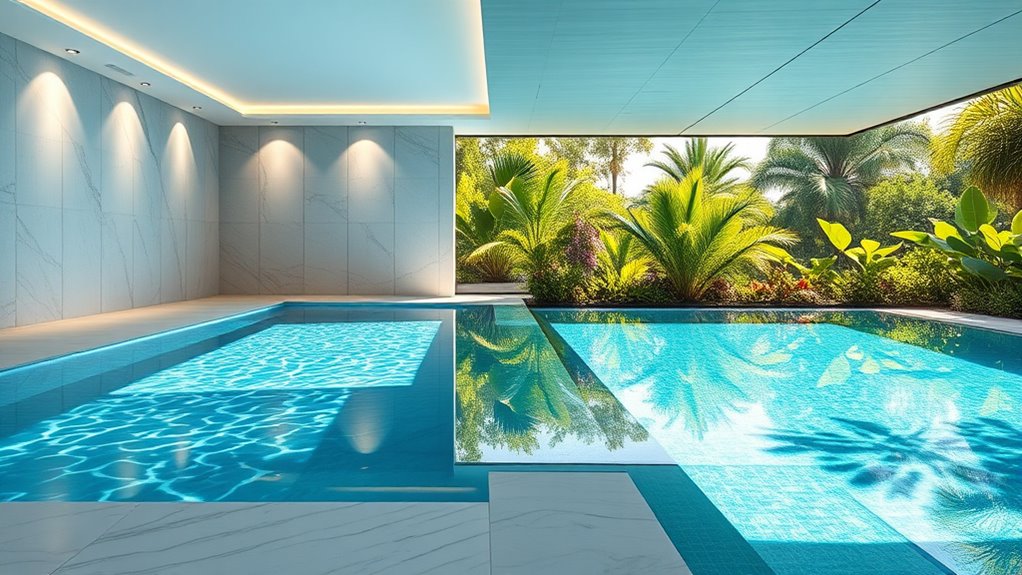
Climate control plays a crucial role in guaranteeing your pool remains comfortable year-round. When you choose an indoor installation, you gain better control over temperature and humidity, allowing you to enjoy your pool regardless of outside weather. You can set the ideal water temperature and maintain it easily, creating a relaxing environment. Outdoor pools depend heavily on the climate, so you might need to invest in heating systems or covers to keep the water warm during colder months. Conversely, outdoor pools are more exposed to the elements, which can lead to temperature fluctuations and discomfort. Indoor pools offer consistent comfort, but they require proper ventilation and climate control systems to prevent humidity buildup and ensure a pleasant experience.
Maintenance and Cleaning Requirements
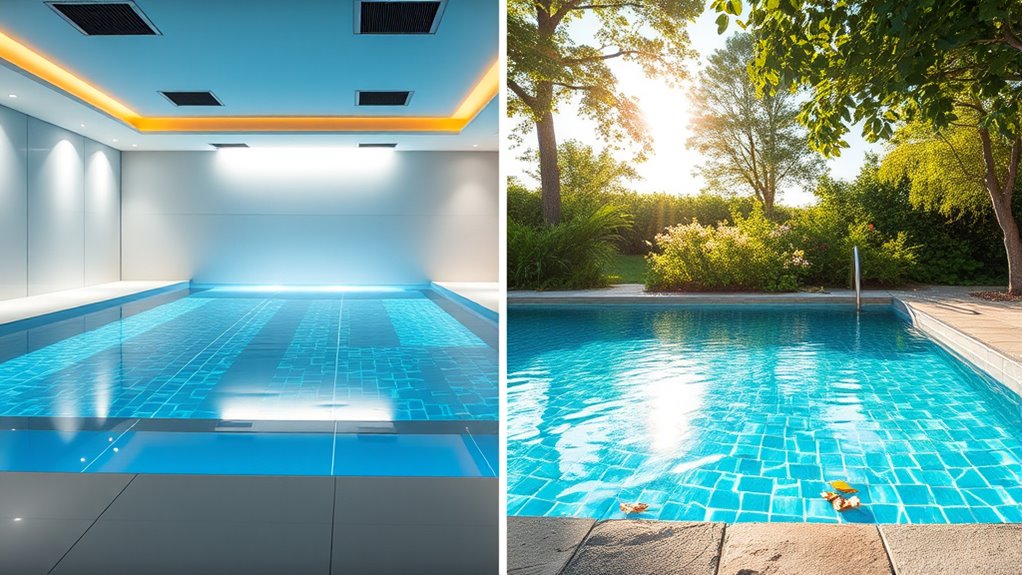
Indoor pools generally require more consistent maintenance and cleaning efforts because the enclosed environment can trap humidity, dirt, and debris. You’ll need to regularly monitor water chemistry, such as pH and chlorine levels, to prevent algae growth and bacteria buildup. Dust, hair, and other particles tend to settle more easily, so frequent skimming and vacuuming are necessary. Additionally, mold and mildew can develop on surfaces if ventilation isn’t adequate, so cleaning and inspecting these areas is essential.
Indoor pools need regular cleaning, water chemistry checks, and good ventilation to prevent mold and debris buildup.
Remember to:
- Check and adjust water chemistry often
- Skim debris daily
- Vacuum the pool regularly
- Clean filters and pumps
- Keep the environment well-ventilated
Cost and Installation Expenses

When comparing indoor and outdoor pools, you’ll notice installation costs can vary widely based on location, size, and features. Outdoor pools often have lower upfront expenses but may incur higher maintenance costs over time. Understanding these differences helps you plan your budget more effectively. Additionally, selecting a wall organization system can improve the visual appeal and functionality of your pool area, especially in outdoor settings.
Installation Costs Variability
Installation costs for pools can vary widely depending on several factors, including location, pool type, and site-specific challenges. For indoor pools, costs often rise due to building modifications, ventilation, and climate control. Outdoor pools usually have lower setup expenses but can face higher costs if your yard requires extensive grading or fencing. Additionally, incorporating elements like a dream outdoor kitchen or pizza oven can add to your overall project expenses. Factors influencing costs include:
- Accessibility of your installation site
- Local labor rates and permit fees
- Custom features like jets or lighting
- Soil conditions affecting excavation costs
- Additional infrastructure, such as decking or enclosures
Being aware of these variables helps you plan your budget accurately and understand why prices differ considerably from one project to another.
Maintenance Expense Differences
Maintaining an indoor pool generally costs more over time due to ongoing expenses like climate control, ventilation, and increased cleaning needs. You’ll spend more on heating since indoor pools often require consistent temperature regulation regardless of outdoor weather. Ventilation systems must run continuously to prevent humidity buildup and mold, adding to your energy bills. Additionally, indoor pools tend to accumulate dust, debris, and chemicals faster because they’re in a controlled environment, leading to more frequent cleaning and chemical balancing. Proper fabric decorating markers can help maintain aesthetic appeal by easily marking or personalizing the area. While installation costs can be similar to outdoor pools, the long-term expenses for indoor setups are higher. You should also consider maintenance equipment, specialized filters, and potential repairs caused by humidity-related wear. Overall, indoor pools demand more of your budget for upkeep over their lifespan.
Accessibility and Convenience
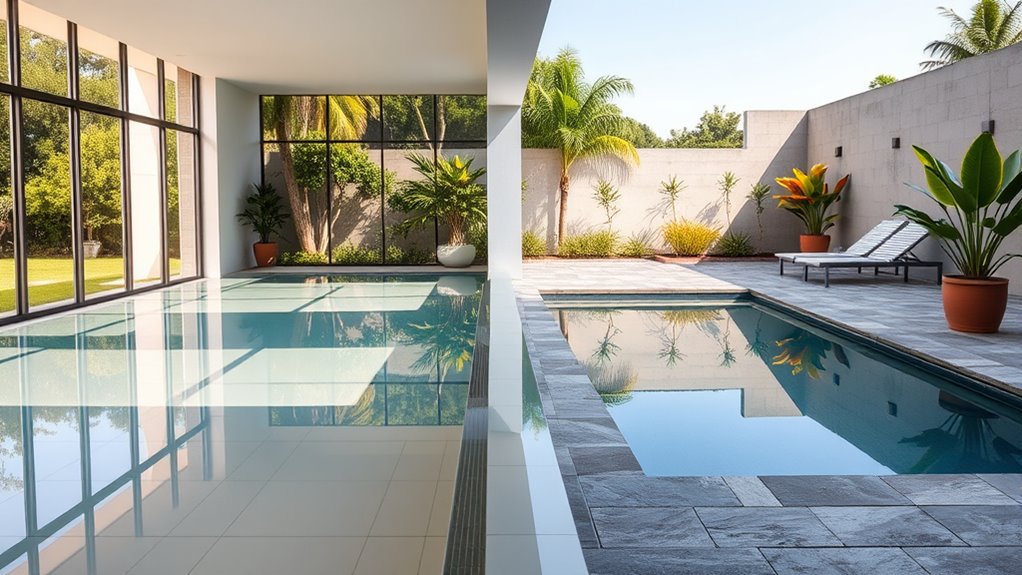
Indoor pools offer unmatched accessibility and convenience, allowing you to enjoy swimming regardless of weather conditions or time of day. With an indoor setup, you don’t need to worry about rain, snow, or extreme heat disrupting your routine. You can swim early in the morning or late at night without stepping outside. Plus, having a pool indoors means you can easily access it from your home, saving you time and effort. It’s perfect for quick workouts or relaxing dips whenever you want. Additionally, many frozen yogurt shops and other amenities are conveniently located nearby, making it easier to combine activities during your day.
Aesthetics and Space Integration
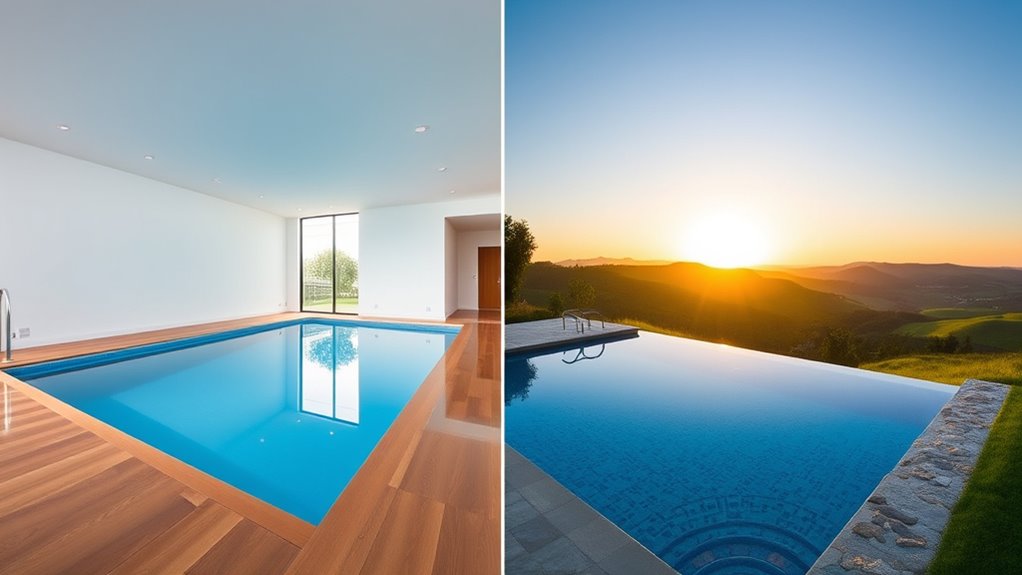
Because indoor pools are integrated directly into your home or facility, their design can substantially enhance the overall aesthetic and harmony of your space. You have the flexibility to customize the pool area with complementary materials, lighting, and decor that match your interior style. This seamless integration creates a luxurious, cohesive look that elevates your environment. Additionally, an indoor pool doesn’t interfere with your landscape or outdoor views, allowing you to focus on creating a polished, harmonious space. You can also incorporate features like waterfalls, built-in seating, or mood lighting to further enhance visual appeal. Moreover, selecting the right projector technology can help create immersive visual experiences that complement your indoor pool area. Ultimately, indoor pools offer a unique opportunity to blend functionality with design, turning your pool area into an elegant, inviting part of your home or facility.
Usage Flexibility and Seasonal Benefits
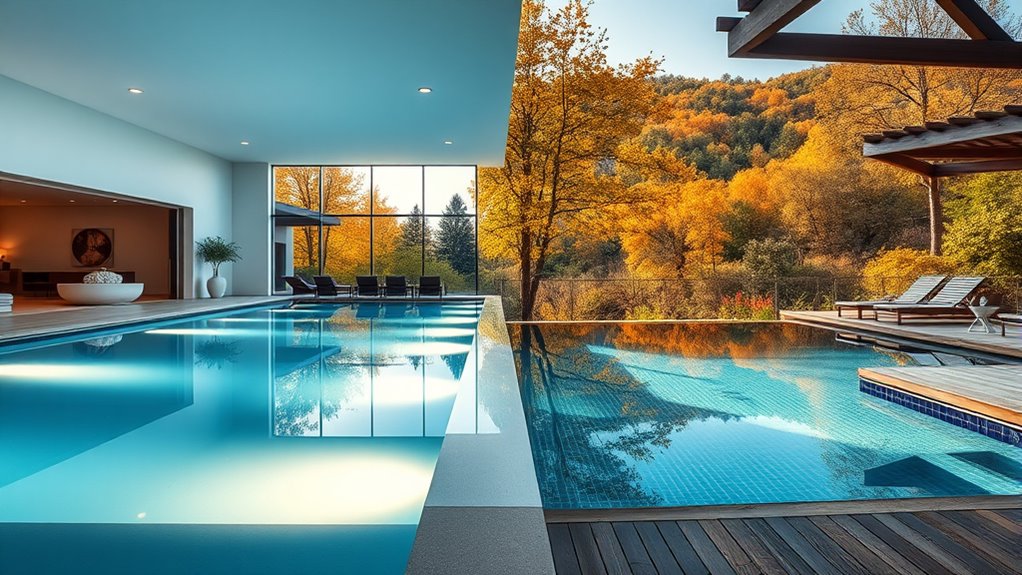
One of the key advantages of indoor pools is their exceptional usage flexibility and seasonal benefits. With an indoor pool, you can swim whenever you want, regardless of the weather outside. No need to wait for perfect conditions or worry about seasonal changes. Plus, you get to enjoy your pool year-round, extending your swimming season far beyond outdoor limits. Creating a comfortable environment ensures consistent water temperature and a pleasant experience in any season.
- Swim during cold winter months without freezing
- Use the pool early mornings or late at night
- Avoid debris, leaves, and insects common outdoors
- Maintain consistent water temperature
- Host family or friends indoors, regardless of the season
Resale Value and Property Appeal
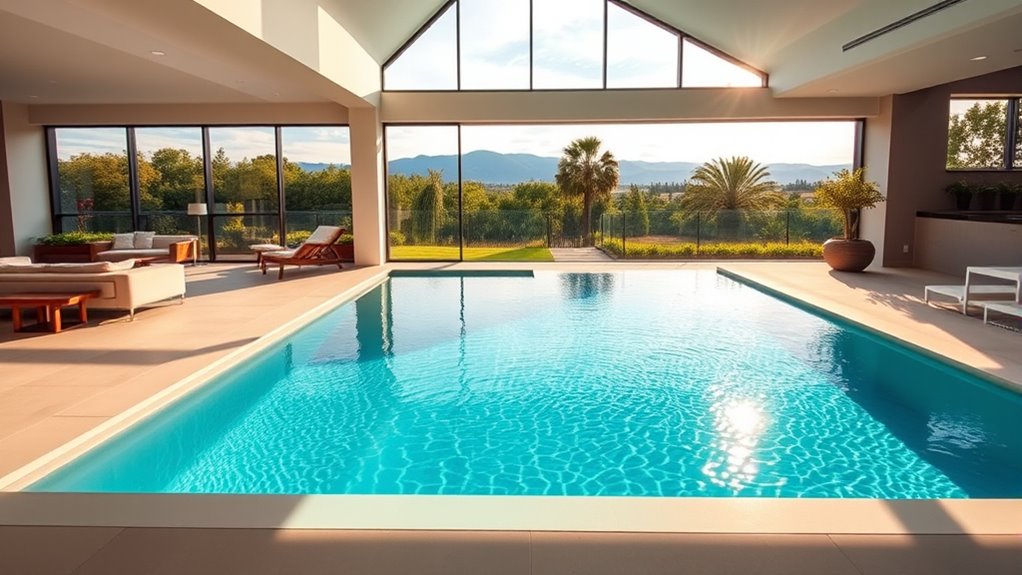
Adding a pool can boost your home’s curb appeal, making it more attractive to potential buyers. It also enhances marketability, especially in warmer climates or upscale neighborhoods. Ultimately, a well-maintained pool can increase your property’s overall value and appeal. Additionally, features like increased energy levels from a properly maintained pool can be a draw for prospective homeowners seeking an active lifestyle.
Curb Appeal Enhancement
Choosing the right pool installation can substantially boost your property’s curb appeal and resale value. An outdoor pool adds a luxurious touch that makes your home stand out, especially during warm months. Conversely, an indoor pool offers a sleek, modern look that appeals to buyers seeking privacy and year-round use. To maximize your investment, consider how the pool complements your landscape or home design. A well-maintained pool can serve as a focal point, attracting potential buyers and increasing interest. Here are some ways to enhance curb appeal:
- Harmonize pool design with your home’s architecture
- Incorporate attractive decking and surrounding landscaping
- Use lighting to highlight the pool area at night
- Ensure the pool area is clean and well-maintained
- Add stylish accessories or furniture to create a welcoming vibe
- Online resources can guide you in choosing the perfect pool style to match your property.
Marketability Boost Potential
A well-installed pool can substantially boost your property’s resale value and overall appeal, making your home more attractive to potential buyers. It signals luxury, recreation, and lifestyle upgrades that many find irresistible. An outdoor pool offers visual appeal and a sense of spaciousness, especially in scenic locations. Conversely, an indoor pool adds modernity and year-round usability, appealing to buyers seeking privacy and convenience. Here’s how each option enhances marketability:
| Feature | Outdoor Pool | Indoor Pool |
|---|---|---|
| Visual Impact | Enhances yard aesthetics | Adds sleek, contemporary look |
| Year-Round Use | Limited by weather | Usable anytime, any season |
| Privacy | Exposed to neighbors | Fully private, enclosed space |
Both options can elevate your home’s desirability, attracting different buyer preferences. Property value can significantly increase with the addition of either feature, making it a worthwhile investment.
Property Value Increase
Installing a pool, whether indoor or outdoor, can considerably boost your property’s resale value and overall appeal. It makes your home stand out in the market and attracts potential buyers looking for luxury and convenience. An indoor pool offers year-round use and privacy, which can appeal to buyers seeking a personal retreat. An outdoor pool adds visual appeal and creates an inviting outdoor space for gatherings. Both options can increase your home’s worth, especially in competitive markets. Plus, pools often enhance your property’s aesthetic, making it more attractive in listings. Consider these benefits:
- Elevated market value
- Increased curb appeal
- Attraction of a wider range of buyers
- Enhanced lifestyle appeal
- Potential for higher resale price
Frequently Asked Questions
How Long Does Indoor Vs Outdoor Installation Typically Take?
Indoor installations usually take 4 to 8 weeks, depending on your home’s structure and any necessary renovations. Outdoor setups tend to be quicker, often completed within 2 to 4 weeks, since they require less interior work. Factors like permits, site preparation, and equipment delivery can influence these timelines. Planning ahead and working with experienced professionals helps guarantee a smooth, timely installation for your indoor or outdoor endless pool.
Can Outdoor Pools Be Used Year-Round in Colder Climates?
Think of your outdoor pool as a brave explorer facing a cold, unpredictable winter. In colder climates, you can still enjoy it year-round if you invest in proper insulation, a sturdy cover, and a reliable heating system. These tools act like warm blankets and protective armor, allowing you to brave the chill. With proper maintenance, your outdoor pool becomes a resilient retreat, welcoming you even in the coldest months.
What Are the Best Safety Measures for Indoor Pools?
You should install safety barriers like fences or covers, supervise swimmers constantly, and guarantee proper lighting around your indoor pool. Keep doors and windows secure to prevent unauthorized access, especially for children. Use non-slip mats and install alarms on doors leading to the pool area. Regularly check and maintain safety equipment, such as life rings and first aid kits. These measures help prevent accidents and keep everyone safe while enjoying your indoor pool.
How Does Weather Affect Outdoor Pool Maintenance?
Ironically, good weather makes outdoor pool maintenance a breeze—until storms or extreme heat hit. Sunshine speeds up evaporation, so you’ll spend more time topping off water and balancing chemicals. Rain washes in debris, and wind blows leaves into your pool, increasing cleaning efforts. Cold weather can cause freezing issues if you’re not prepared. So, while good weather might seem ideal, it actually demands more vigilance to keep your pool pristine.
Are There Specific Permits Needed for Indoor or Outdoor Pools?
Yes, you’ll need permits for both indoor and outdoor pools. Check your local building codes and zoning laws first, as requirements vary by area. Usually, you’ll need approval for structural changes, electrical work, and safety features like fencing or barriers. Applying for the right permits guarantees your installation complies with regulations and avoids fines or delays. Contact your local building department to get started on the necessary paperwork.
Conclusion
Choosing between an indoor or outdoor endless pool depends on your lifestyle and priorities. Will you prioritize year-round comfort and privacy, or enjoy the fresh air and outdoor scenery? Both options have their perks and challenges, so consider what matters most to you. Ultimately, your decision shapes your home’s value and your daily relaxation. Are you ready to create a personal oasis that suits your needs and enhances your life?



